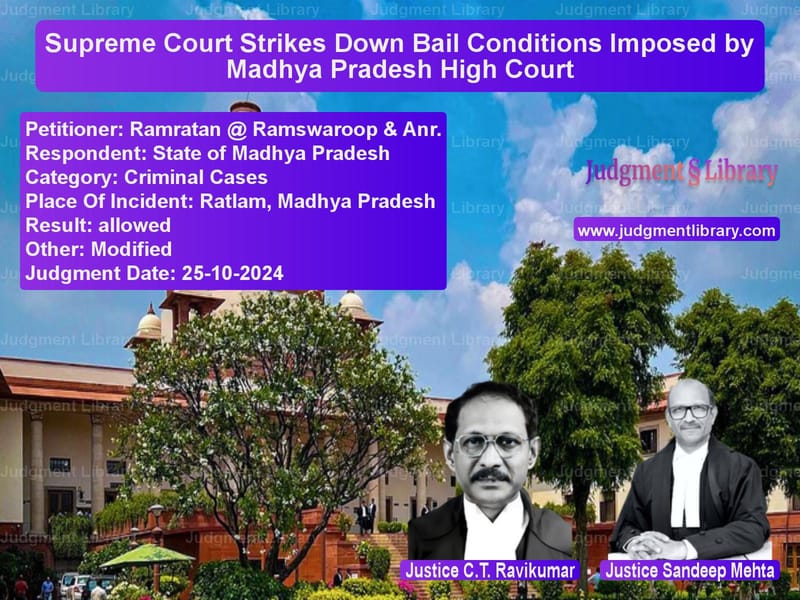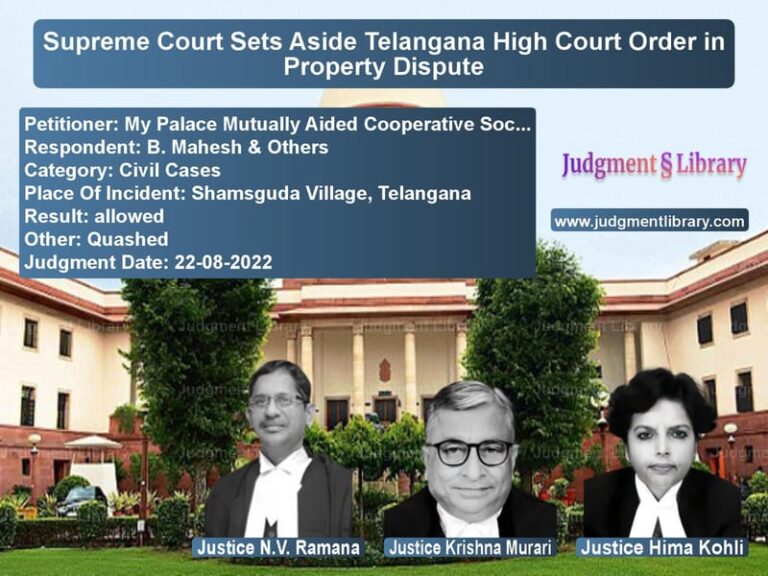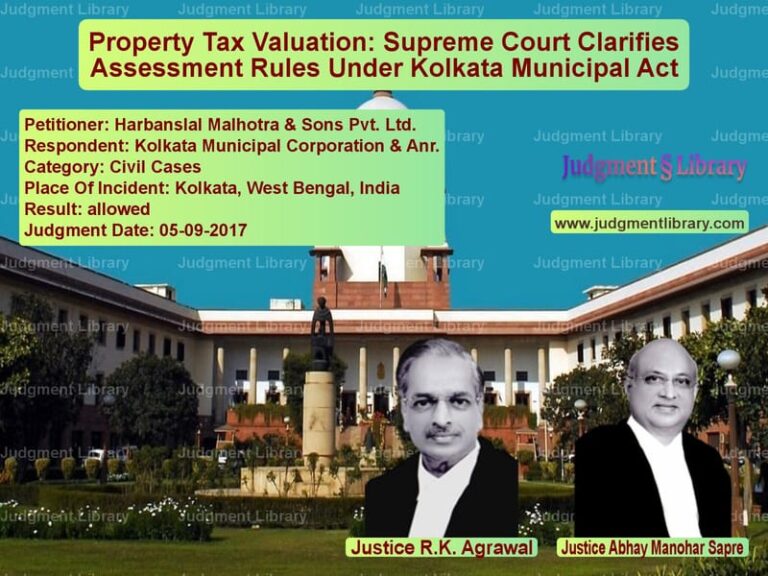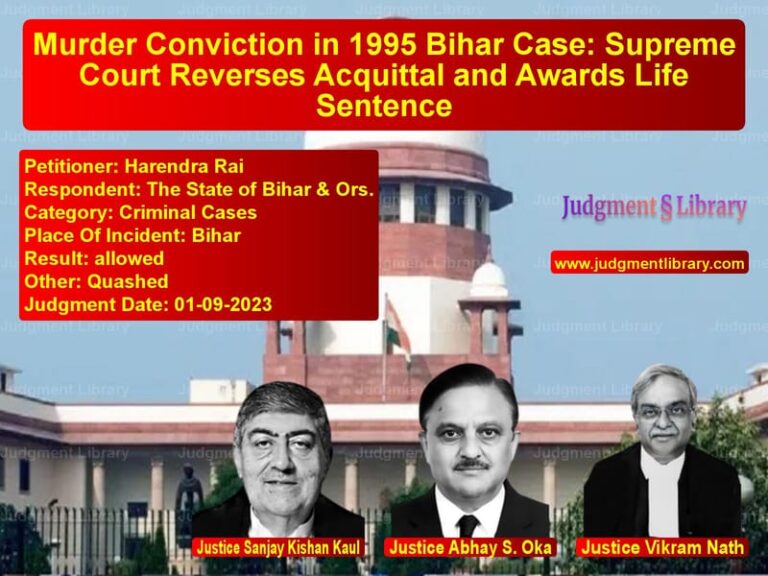Supreme Court Strikes Down Bail Conditions Imposed by Madhya Pradesh High Court
The Supreme Court of India, in Ramratan @ Ramswaroop & Anr. v. State of Madhya Pradesh, delivered a significant judgment on October 25, 2024, striking down onerous bail conditions imposed by the Madhya Pradesh High Court. The Court ruled that the High Court overstepped its jurisdiction by directing the removal of a wall and handing over disputed property to the complainant, which had direct implications on a pending civil suit.
Background of the Case
The case originated from an FIR No. 539 of 2024, registered on April 22, 2024, at Police Station Road, Ratlam, Madhya Pradesh. The complainant, Ghanshyam Lashkari, alleged that the appellants forcibly entered his property, broke a wall, and assaulted his family. Consequently, the appellants were charged under various sections of the Indian Penal Code (IPC), 1860, including:
- Section 294 (Obscene acts)
- Section 323 (Causing hurt)
- Section 506 (Criminal intimidation)
- Section 447 (Criminal trespass)
- Section 147 (Rioting)
- Section 148 (Rioting with deadly weapons)
- Section 458 (Lurking house trespass)
- Section 149 (Unlawful assembly)
- Section 326 (Voluntarily causing grievous hurt by dangerous weapons)
Timeline of Events
- April 22, 2024: FIR registered against the accused.
- April 27, 2024: Appellants were arrested.
- May 29, 2024: First bail application dismissed with liberty to apply after the chargesheet was filed.
- June 20, 2024: Chargesheet filed under the aforementioned sections.
- July 25, 2024: High Court granted bail with conditions of property restoration.
- October 25, 2024: Supreme Court struck down these conditions.
Petitioner’s Arguments (Ramratan & Anr.)
The petitioners, represented by Senior Advocate Puneet Jain, argued:
- The High Court’s order exceeded the scope of bail proceedings by directing property possession.
- The pending civil suit over ownership of the property was prejudiced by the bail order.
- The court’s role in bail applications is to ensure the presence of the accused during trial, not to adjudicate property disputes.
- The direction for removal of a wall at the appellants’ expense was unreasonable and beyond jurisdiction.
Respondent’s Arguments (State of Madhya Pradesh)
The State of Madhya Pradesh, represented by its counsel, countered:
- The appellants had forcibly encroached on the complainant’s property.
- The High Court’s conditions were necessary to restore status quo and prevent further disputes.
- There was a genuine fear that the accused would tamper with evidence if released without conditions.
Supreme Court’s Analysis and Judgment
Exceeding Jurisdiction in Bail Matters
The Supreme Court observed that the High Court exceeded its jurisdiction under Sections 437(3) and 439 of the Criminal Procedure Code (CrPC):
“The fundamental purpose of bail is to ensure the accused’s presence during the investigation and trial. Any conditions imposed must be reasonable and directly related to this objective.”
Property Dispute Should Be Decided in Civil Court
The Court held that the High Court’s direction to hand over property to the complainant violated the ongoing civil proceedings:
“The order to transfer possession affects civil rights and prejudices the pending suit titled ‘Government of Madhya Pradesh v. Durga Lashkari & Ors.’ The bail court is not a forum to determine ownership.”
Police Intervention in Property Possession Unlawful
The Court criticized the police’s role in taking possession of the property and handing it over to the complainant:
“Under no circumstances can the police interfere in property possession matters without due process. Such action reflects total lawlessness.”
Final Judgment
The Supreme Court ruled:
- The condition to demolish the wall at the appellants’ expense is set aside.
- The direction to hand over property keys to the complainant is struck down.
- The bail conditions ensuring the appellants’ presence during trial remain.
- The decision in RCSA No. 2019 of 2024 (civil suit) shall not be prejudiced by this order.
Key Takeaways from the Judgment
- Courts Cannot Decide Property Rights in Bail Orders: Property disputes must be resolved in civil suits.
- Police Must Not Meddle in Property Possession: Law enforcement cannot unilaterally take possession of property.
- Bail Conditions Must Be Reasonable: Courts should impose conditions strictly related to ensuring the accused’s presence in trial.
Impact of the Judgment
- Reaffirms the Limited Scope of Bail Orders: Prevents courts from overstepping their role in criminal proceedings.
- Protects Property Owners from Arbitrary Actions: Ensures that property disputes are resolved through proper legal channels.
- Guidance for Future Bail Cases: Establishes a precedent on what conditions can and cannot be imposed in bail matters.
Conclusion
The Supreme Court’s ruling in Ramratan @ Ramswaroop & Anr. v. State of Madhya Pradesh is a landmark decision reinforcing the principle that bail conditions must not infringe upon civil rights. By striking down the High Court’s directives regarding property possession, the judgment ensures that bail proceedings remain within their legal limits. The ruling also serves as a warning against police overreach in property disputes.
Petitioner Name: Ramratan @ Ramswaroop & Anr..Respondent Name: State of Madhya Pradesh.Judgment By: Justice C.T. Ravikumar, Justice Sandeep Mehta.Place Of Incident: Ratlam, Madhya Pradesh.Judgment Date: 25-10-2024.
Don’t miss out on the full details! Download the complete judgment in PDF format below and gain valuable insights instantly!
Download Judgment: ramratan-@-ramswaroo-vs-state-of-madhya-prad-supreme-court-of-india-judgment-dated-25-10-2024.pdf
Directly Download Judgment: Directly download this Judgment
See all petitions in Bail and Anticipatory Bail
See all petitions in Landlord-Tenant Disputes
See all petitions in Damages and Compensation
See all petitions in Property Disputes
See all petitions in Criminal Conspiracy
See all petitions in Judgment by C.T. Ravikumar
See all petitions in Judgment by Sandeep Mehta
See all petitions in allowed
See all petitions in Modified
See all petitions in supreme court of India judgments October 2024
See all petitions in 2024 judgments
See all posts in Criminal Cases Category
See all allowed petitions in Criminal Cases Category
See all Dismissed petitions in Criminal Cases Category
See all partially allowed petitions in Criminal Cases Category







